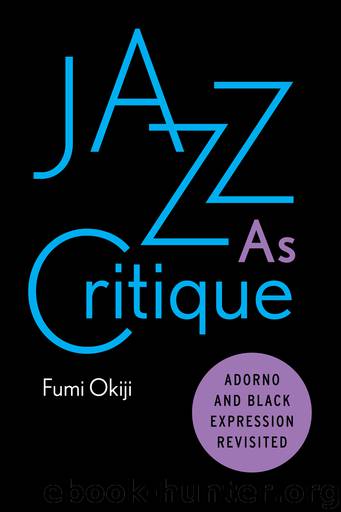Jazz As Critique by Okiji Fumi

Author:Okiji, Fumi [Okiji, Fumi]
Language: eng
Format: epub
Publisher: Stanford University Press
Published: 2018-03-19T16:00:00+00:00
POSTSCRIPT
Some Thoughts on the Inadequacy and Indispensability of Jazz Records
1
The history of jazz is inextricably tied to the history of the jazz record.1 We know of the foundational importance of figures such as trumpeter Buddy Bolden, but because of the absence of recordings, we can only speculate on the particulars of his influence.2 To talk about the history of jazz is really to talk about the history of the jazz record. This point is hammered home by the fact that Bolden was a contemporary of fellow cornetist King Oliver and of a young Sidney Bechet (clarinet).3 We have extensive audio archives for both. The lack of such for Bolden places him in a distinct historical position. The unrecorded tradition is the antehistory of jazz, traces of which no doubt still inform the material being used today, despite our inability to identify them with any certainty.4 Through them the music can be freeze-framed for analytic and pedagogical purposes. Analysts—whether Schenkerian or Afrological, structural or interpretive—can discuss with some confidence the formal principles of the music contained in the format and the development, trends, and innovations that have shaped the tradition. While what is written about jazz musicians and the scene is shrouded in myth and half-truth, the jazz record gives what is most often considered the indisputable document of the tradition.
2
Jazz and the gramophone are often presented as paradigms of twentieth-century culture, two emblems of the tectonic cultural shift from old Europe to the United States. In distinct and related ways jazz and the record provide the background to the American century. It is not only that the two, recording technology and jazz, developed concurrently but also that jazz, as we know it, is utterly dependent on that technology for its development. While it may be a stretch to suggest that jazz would not have developed at all without records, it is surely indisputable that it would have taken on a markedly different, and less rich, character. I am trying to imagine Charlie Parker relieved of his Lester Young 78s, or Mingus’s experiments on the border between composition and improvisation with the Jazz Workshop without him having studied Ellington’s own trials, or what contemporary piano trios might sound like without that handful of albums recorded by the 1959–62 Bill Evans group. Abstracting isolated examples to demonstrate the importance of records to the tradition is peculiar for a music so intimately identified with this technology.
3
Oral traditions in music are usually transmitted from mouth to mouth. They rely on a flesh-and-blood teacher passing on his or her interpretation of the musical material to a flesh-and-blood student. Unlike the modern European tradition, within which scores allow for a certain amount of student independence, music that is taught and learned without recourse to texts gives the teacher (and his or her particular view on the material—its limitations and possibilities) much authority. A genuine innovation of jazz, and the record technology with which it grew up, is the democratization of African (American) oral tradition. Demonstration is heard on record alongside (and in some cases rather than from) an in-person teacher.
Download
This site does not store any files on its server. We only index and link to content provided by other sites. Please contact the content providers to delete copyright contents if any and email us, we'll remove relevant links or contents immediately.
| Appreciation | Blank Sheet Music |
| Composition | Conducting |
| Exercises | Instruction & Study |
| Lyrics | MIDI, Mixers, etc |
| Philosophy & Social Aspects | Songwriting |
| Techniques | Theory |
| Vocal |
The Goal (Off-Campus #4) by Elle Kennedy(13657)
Kathy Andrews Collection by Kathy Andrews(11812)
Diary of a Player by Brad Paisley(7559)
Assassin’s Fate by Robin Hobb(6199)
What Does This Button Do? by Bruce Dickinson(6195)
Big Little Lies by Liane Moriarty(5790)
Altered Sensations by David Pantalony(5093)
Pale Blue Dot by Carl Sagan(4996)
Sticky Fingers by Joe Hagan(4188)
The Death of the Heart by Elizabeth Bowen(3608)
The Heroin Diaries by Nikki Sixx(3543)
Confessions of a Video Vixen by Karrine Steffans(3301)
Beneath These Shadows by Meghan March(3300)
How Music Works by David Byrne(3259)
The Help by Kathryn Stockett(3139)
Jam by Jam (epub)(3072)
Harry Potter 4 - Harry Potter and The Goblet of Fire by J.K.Rowling(3059)
Computational Linguistics and Intelligent Text Processing: 20th International Conference, CICLing 2019 La Rochelle, France, April 7â13, 2019 Revised Selected Papers, Part I by Alexander Gelbukh(2981)
Strange Fascination: David Bowie: The Definitive Story by David Buckley(2857)
